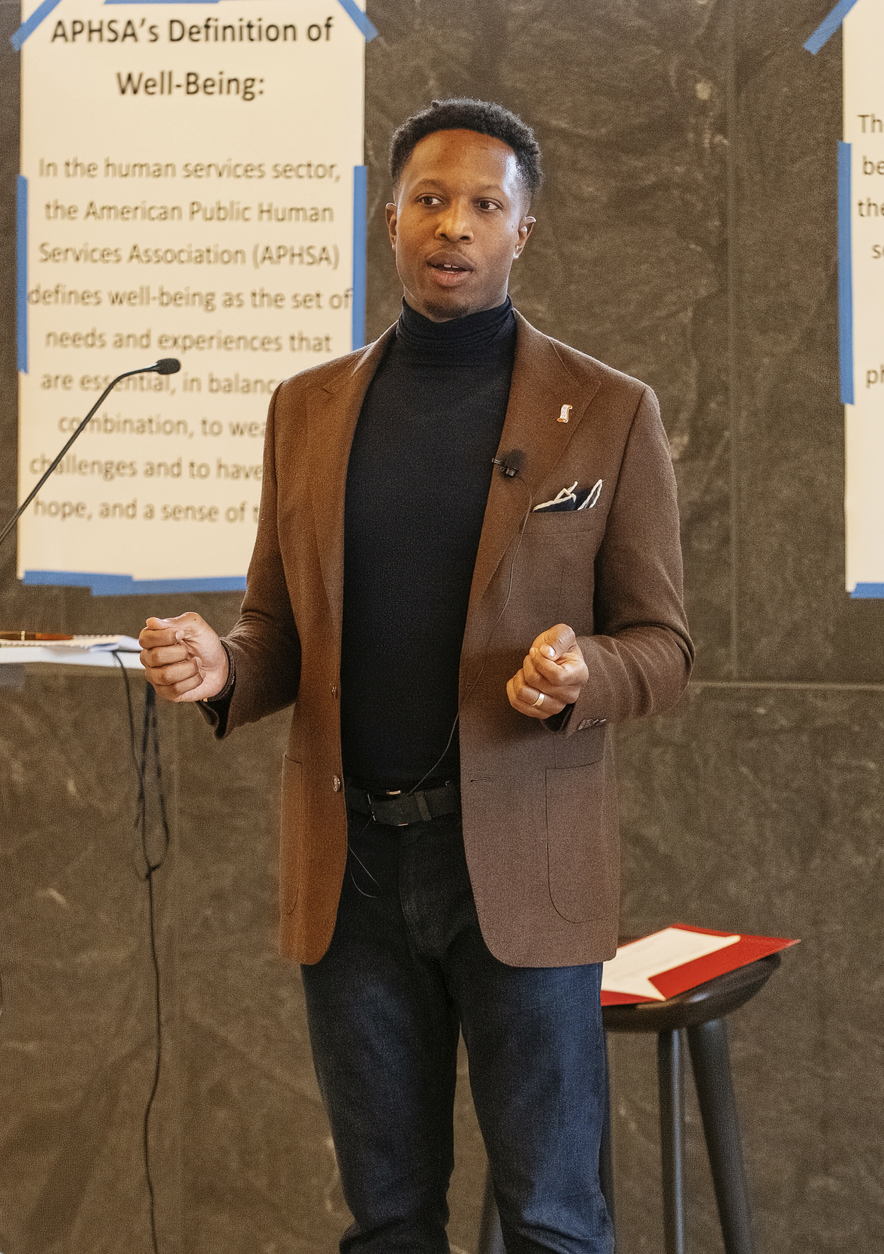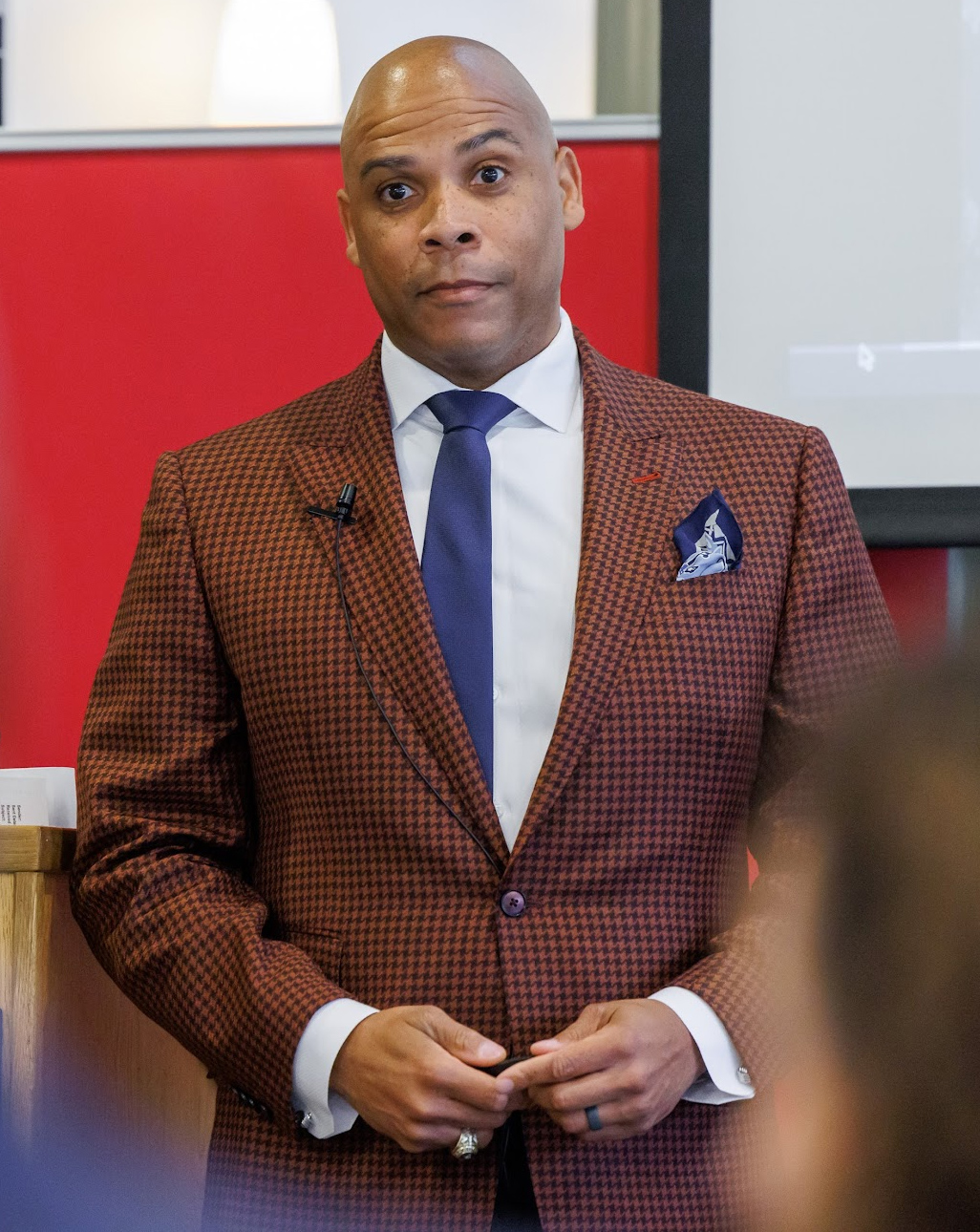The Learning Journey
How We Define Social and Economic Mobility
We define social and economic mobility as the movement of families between social strata and their ability to improve their wealth and economic status. This includes a person’s autonomy, power, and ability to influence his or her environment and personal outcomes.
The Launch
In August of 2023 former cohort organizations of the Kresge Next Generation of Human Services Initiatives were invited to select one frontline worker and supervisor to participate in a year-long Learning and Action Institute. Over the course of a year, the Frontline Innovators experienced built upon prior discussions, learnings, and collective contributions toward how the human services sector can further advance multigenerational family social and economic success and person-centered systems. Insights, case studies, and frameworks from the two national NextGen cohorts can be found at here:
The Journey
October 2023
The learning journey began at the Kresge Foundation, October 15-17, 2023. During their first Learning and Action Institute, the group focused on:
- Understanding and applying the art and science of wellbeing
- Accelerating Two-Generation (2Gen) efforts,
- Operationalizing the Human Services Value Curve (HSVC)
- Activating a network of human services Frontline Innovators.
Dr. Antonio Oftelie of Leadership for a Networked World and the Harvard John A. Paulson School of Engineering and Applied Sciences, introduced the program and the HSVC. Cohort members introduced themselves, their organizations, and challenge questions pertaining to 2Gen strategies and wellbeing. Marjorie Sims of Ascend and Tiffany Day of Daylight Solutions provided an overview of 2Gen’s origins and evolution, five guiding principles, six levers or domains, and engaged participants in a series of activities to reflect on and enhance their 2Gen efforts, including discussions about how they are reaching families, building social capital, shifting mindsets to embark on 2Gen, and designing the next steps of the 2Gen journey.

Chad Thomas of CG Squared shared personal, professional, and psychological benefits of leveraging wellbeing, discussed the domains of wellbeing, helped cohort members to develop their own definition of wellbeing, and engaged the cohort in a set of activities to reflect on strategies to recharge, enhance wellbeing, overcome obstacles, and educate families. And, Basil Dosunmu, the current Chief Financial Officer for the Richmond International Airport and Former Deputy Commissioner of Finance for the Tennessee Department of Human Services and Gena Lewis, a Senior Fellow at the Kresge Foundation and Former Tennessee Department of Human Services Deputy Commissioner and General Counsel joined Dr. Raquel Hatter, Managing Director at the Kresge Foundation and Former Commissioner of Tennessee Department of Human Services in a candid conversation exploring topics ranging from creating connections to shifting mindsets to seizing opportunities to exercising influence to building feedback loops to committing to authenticity.
To deepen learnings following the Learning and Action Institute cohort members participated in an online forum and surveys to share key takeaways from the experience and ideas for a cohort-wide initiative to accelerate 2Gen approaches and advance wellbeing. Many of the lessons highlighted specific examples from the public sector.
March 2024
In March of 2024 we convened the group for their first webinar featuring Dr. Darrick Hamilton - a university professor, the Henry Cohen Professor of Economics and Urban Policy, and the founding director of the Institute on Race, Power and Political Economy at The New School and noted Economist who works nationally and abroad. During the session, Dr. Hamilton shared about the importance of a people-centered economy which prioritizes investing in people. Dr. Hamilton helped us understand how a people-centered economy enables an economy that ensures economic policies and activities contribute to social justice, equality, and dignity. Further, it facilitates an economy that actively mitigates discriminatory structures through economic guarantees that shift resources toward people and communities who need them the most.
He also shared research, data, and insights on the causes and consequences of racial and ethnic inequality in the US, with an emphasis on health and economic outcomes. He explored potential systemic remedies. He reflected on implications for wellbeing, multigenerational family social and economic success, and policy and advocacy, and he engaged the group in a dialogue about the challenges and opportunities presented for innovative frontline human services staff. As one participant reflected, “I learned that economics is a category within Human Rights.”
June 2024
In June, we hosted a webinar for the cohort designed to: share inspiration and tools to leverage frontline voice and amplify frontline policy and advocacy influence; build understanding of 2Gen policy levers; and, set the stage for the cohort-wide initiative efforts to develop Frontline policy and practice insights to accelerate 2Gen approaches. Gregg Croteau and Nichelle Sadler of UTEC provided an overview and insights of their policy work, including success stories and lessons learned. They also spoke about “Policymaking 101” defining terms, describing what is required, and outlining the frontline competencies needed to execute on these efforts. Matt Lyons of APHSA then explained how APHSA drives policy and practice change within public systems and how their work connects to frontline workers. He shared opportunities for influence, and he offered 2Gen policy recommendations and resources. As one cohort member described the webinar, “it reinforced that to advance social and economic mobility it is important to shift power by centering lived
August 2024
In August of 2024 the cohort participated in the PolicyLink Equity Summit in Atlanta, Georgia which launched 22 years ago in Los Angeles. PolicyLink aims to realize the promise of equity, recognizing that every policy and investment must provide significant, sustained support to the people hurting most; and it serves as a bridge to creating an equitable economy, an inclusive and compassionate society, and a strong, accountable democracy. Dr. Michael McAfee, CEO of PolicyLink opened the summit with a call-to-action sharing, "We the People are the true Founders. We always have been, even when deemed invisible under the law. We have the power to realize a nation that loves, honors, and serves all — deserving of the generations to come. It is ours to build together.”
During the Summit cohort members participated in “Soul Day,” engaged in sessions on redesigning structures pertaining to government, business, and power, explored opportunities to design policies that deliver for all. and engaged in keynote sessions featuring:
- Isabel Wilkerson is a winner of the Pulitzer Prize and the National Humanities Medal, an author, a lecturer, and the catalyst and main character in the movie Origin written and directed by Ava DuVernayl.
- Nikole Hannah-Jones is a Pulitzer Prize-winning reporter covering racial injustice for The New York Times Magazine and creator of the landmark The 1619 Project, now a Hulu original docuseries.
- Ibram X. Kendi is a National Book Award-winning author of sixteen books for adults and children, including ten New York Times bestsellers—five of which were #1 New York Times bestsellers. Dr. Kendi is the Andrew W. Mellon Professor in the Humanities at Boston University, and the director of the BU Center for Antiracist Research. He is a contributing writer at The Atlantic and a CBS News racial justice contributor.
For additional insights, please visit the PolicyLink Equity Summit website and blogs written by cohort members about their experiences.
September 2024
The group engaged in a discussion of a case study on Deion Sanders examining leadership, team dynamics, leading change, and wellbeing, with Dr. Hise Gibson of Harvard Business School. Tiffany Day of Daylight Solutions led the group through a two-part session designed to synthesize and activate key learnings, actions, and strategies to advance 2Gen policy solutions. Chad Thomas of CG Squared helped cohort members to identify obstacles hindering their ability to thrive, explore strategies to overcome these challenges, and gain practical tools and insights to navigate the emotional complexities of their roles, reduce burnout, and cultivate a positive and sustainable work culture. And Lauren Hirshon of Leadership for a Networked World led the group through sessions to reflect on their experience, considering progress they made personally and working with families and individuals, learnings they brought back to their organizations, and how their thinking evolved about wellbeing, 2Gen efforts, person-centered systems change, and centering racial equity and racial justice to advance multi-generational family social and economic success.
 Harvard Business School Professor Hise Gibson presenting at the 2024 Frontline Innovators convening at Harvard University.
Harvard Business School Professor Hise Gibson presenting at the 2024 Frontline Innovators convening at Harvard University.Virtual Collaboration & Reflections
Throughout the year, cohort members also worked together virtually via APHSA’s community of practice THRIVE. They shared take-aways from each convening, offered insights and reflections on wellbeing, provided policy and practice recommendations to accelerate 2Gen approaches, and shared strategies, techniques, tools, and ideas to advance multi-generational family social and economic success. In addition, several cohort members participated in interviews to advance the cohort-wide initiative.
